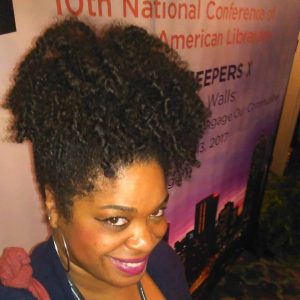
Katrina poses in front of the National Conference of African American Librarians’ banner.
Middlebury’s Literatures & Cultures Librarian Katrina Spencer attended the National Conference of African American Librarians (NCAAL) in Atlanta, Georgia. See a brief video from the opening session shared on Twitter and read more coverage of the event in American Libraries’ Magazine.
How was your conference?
OMG, great! I feel like this conference was Middlebury’s personal gift to me. It fed my soul, which was hungrier than I expected.
What made it great?
For the first time ever, I actually got to stay on site where the conference I was attending was being held. That makes a huge difference– to not have to catch a taxi, bus or train to the conference site and navigate inclement weather/downpours of rain, and also to be able to retire to one’s room to take breaks between sessions was a blessing!
There were beautiful people in the city. Beautiful black people. With braids, twist-outs, locks… And it was the first time that I’d seen black and white people voluntarily spending time together on such a scale. When I’ve seen this in the past, it has been rather exceptional and episodic. There I saw people from both groups treating each other fraternally. I can’t say I was expecting that and I can’t say, after 30 years, that I’d seen it before as such a normalized part of a landscape. But, to see that and to juxtapose it with the news from Charlottesville, Virginia is mind-boggling. Progress in terms of racial politics in this country, to say the very least, is spotty.
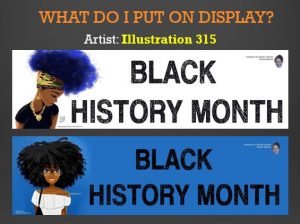
With much help from Davis Family Library’s Marlena Evans, the banners to be used during the February 2018 Black History Month display have been designed. Katrina’s presentation posed the question, “What do I put on display?” and encouraged librarians to think critically about their choices.
What was your presentation on?
The title of my proposal was “What I Wish I Would Have Known” and referred to my education on black history and blackness as a child growing up in Los Angeles in the 1990s. Succinctly, the Transatlantic Slave Trade impacted almost the entire Western hemisphere, not just the United States; the struggle for civil rights and social justice did not end in the 1960s; and black peoples are not defined by the violent scenarios and oppressive societies we encounter, yesterday, today, or tomorrow.
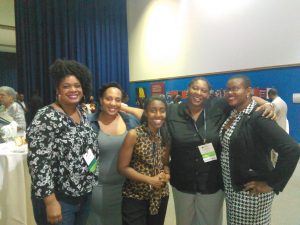
Katrina (far left) poses with librarians and archivists who all graduated from the University of Illinois, Urbana-Champaign, with library and information science degrees.
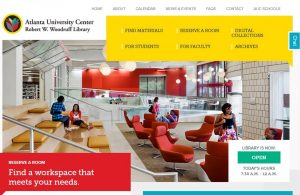
A screenshot from the Atlanta University Center’s Robert W. Woodruff Library website.
What did you do?
I visited historic and cultural sites, for example, the Auburn Avenue Research Library on African American Culture and History and the Atlanta University Center’s (AUC) Robert W. Woodruff Library that serves Clark Atlanta University, Morehouse College, and Spelman College. I also spent time with several alums from my library and information science alma mater, the University of Illinois, Urbana-Champaign.
What did you learn?
- Clark Atlanta University, Spelman College, and Morehouse College are all served by the same library.
- The AUC’s archives currently hold Dr. Martin Luther King’s briefcase.
- Malcolm X wrote postcards home from Lebanon and signed them “El Hajj Malik El Shabazz,” also held in the AUC archives.
- Despite the fact that many HBCUs are suffering in terms of securing funds to properly maintain their grounds and facilities, the AUC is tremendous, popular, and well maintained.
- There’s a published book of photos on Muhammad Ali’s life and fights that weighs over 70 pounds! A copy is held in the Auburn Avenue Research Library’s archives.
- The library and information science field is more intimate than you might think!
- Black librarians are interested in revamping the ways in which we teach about black history.
- Tom Joyner is famous and funny. And he says he met his wife in a library.
- BCALA is interested in recruiting new members to its body.
Were you inspired to pursue new projects? Come up with any news ideas?
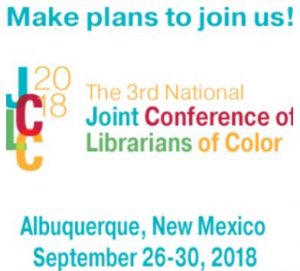
Screenshot of an image published on the 3rd National Joint Conference of Librarians of Color (JCLC) website
Absolutely!
- First, diversity recruiters Leo Agnew from the University of Iowa and Kathryn Kjaer from the University of California, Irvine, were essentially looking for ways to recruit and retain people of color within their libraries at their respective institutions. As someone from that target demographic, I have thoughts, strategies and insight I want to share with them.
- Second, I learned that BCALA publishes its own seasonal newsletter, BCALA News, in which, among other pieces, literary works are reviewed. I’ll pitch an idea to the editor.
- Third, in every conference bag, there was a save-the-date type of invitation to 2018’s Joint Conference of Librarians of Color. I wasn’t aware of the meeting but now I want to attend.
Anything you might do differently next time?
It would be great to have my presentation entirely prepped before departing for the conference site so that when I’m there, all I have to be concerned about is showing up.